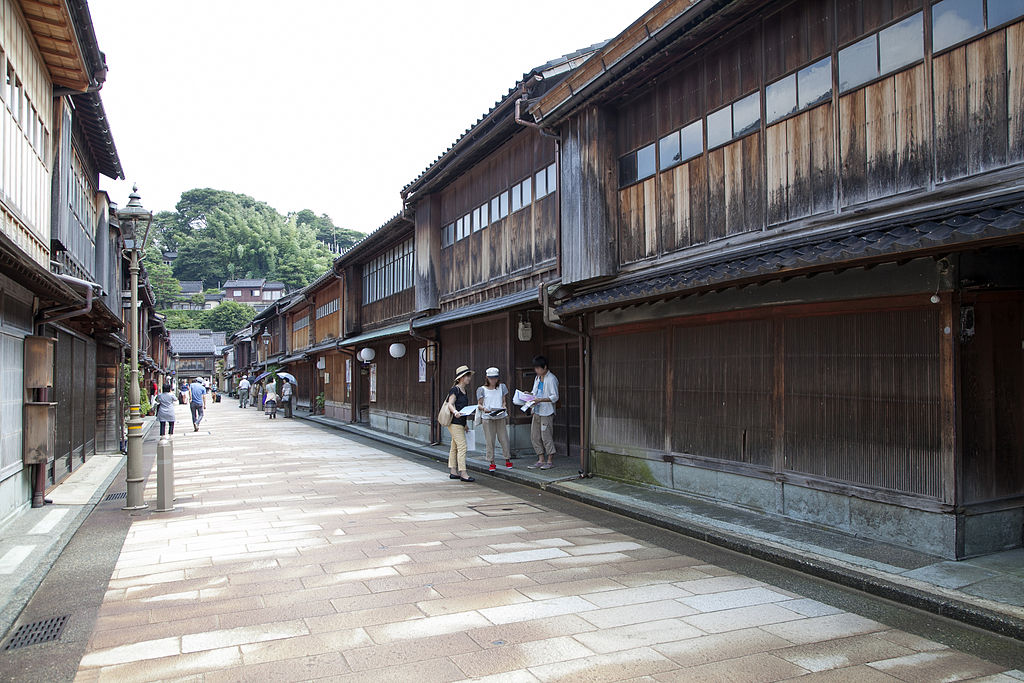What to do in Kanazawa
In Kanazawa you can find one of the most beautiful gardens in Japan and the ancient quarters of the geisha and samurai.
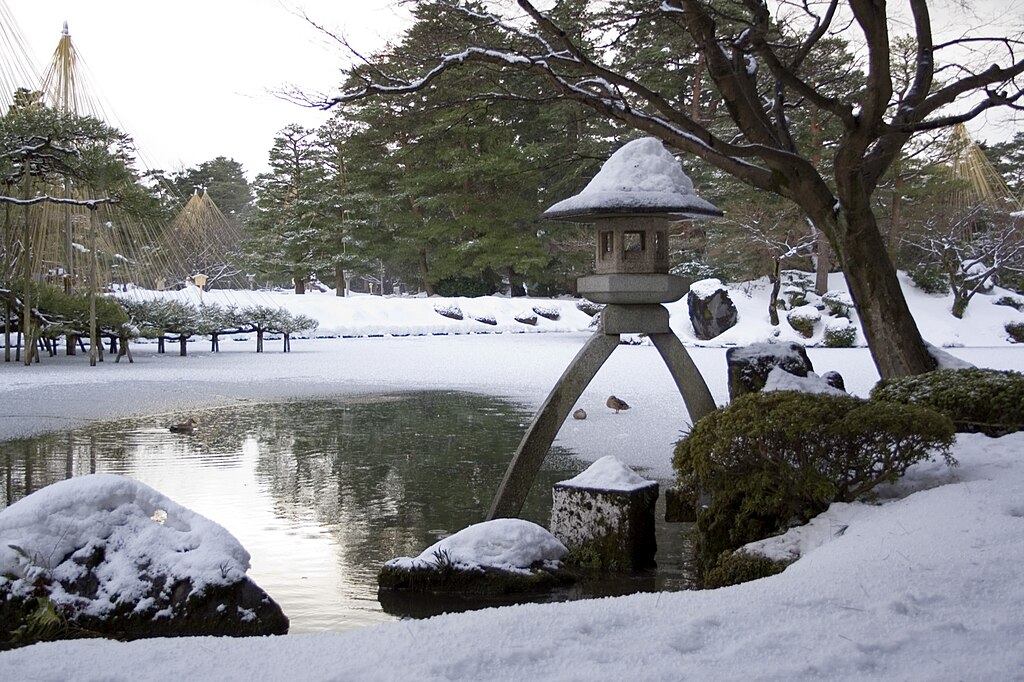
The Kenrokuen Garden is one of the most iconic places in Kanazawa. Also known as ‘The Garden of Six Subtleties’, it is one of the three most beautiful and famous gardens in Japan. Located near Kanazawa Castle, the garden offers a peaceful and relaxing experience with its ponds, streams, bridges and waterfalls. Walking through the garden’s paths is like entering an enchanted world, thanks to the perfect balance between nature and architecture. The Kenrokuen Garden is a compulsory stop for those visiting Kanazawa and one cannot leave the city without visiting it.
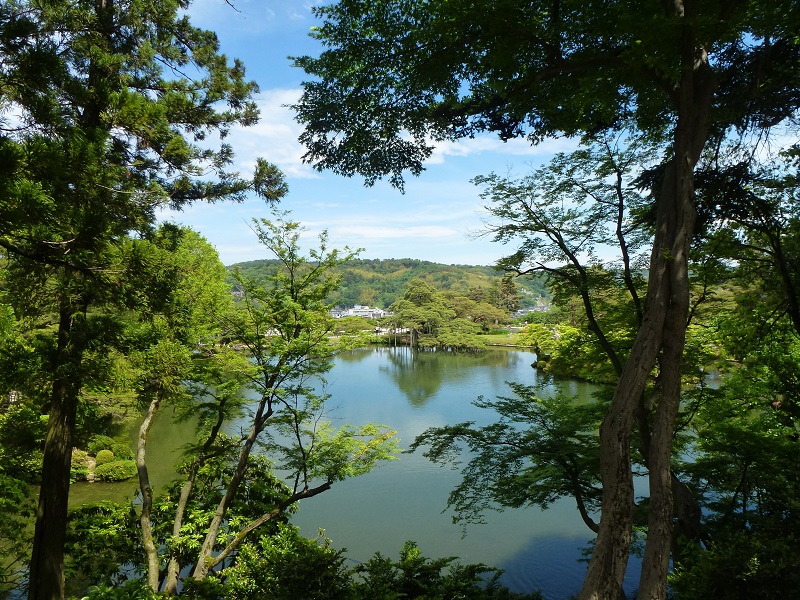
Photo by Japanforeveryone.com
Practical information
| View location on Google Maps | |
| Official website |
|
| Regular hours: 7:00-18:00 (1 March-15 October) 8:00-17:00 (16 October-28/29 February) Early entry hours: Opening from 5:00 (April-August from 4:00, November-February from 6:00) Visitors entering early in the morning must leave before the regular opening time For early entry only the Renchi-mon and Zuishinzaka entrances are open |
|
| No closing days | |
| 320 Yen (free during early entry hours) | |
| 35 minutes’ walk south-east of JR station Hokutetsu bus (exit east, stop number 3 – 15 minutes, 210 Yen) JR Bus (east exit, stop number 4 – 15 minutes, 210 Yen), included in Japan Rail Pass Kanazawa Loop Bus (stops RL7 and LL9) |
Ninjadera (Myouryuji)
The Myoryuji Temple in Kanazawa, also known as the Ninja Temple, is one of Japan’s most mysterious and fascinating buildings. Built during the feudal period, this temple was famous for its defensive architecture and its many secret passages and traps. Each visit to Myoryuji is accompanied by a guide who explains the temple’s secrets and shows the special features of the building. The Myoryuji Temple is a must-see destination for those wishing to discover the mysteries of Japanese culture.
Irina Gelbukh, CC BY-SA 3.0, via Wikimedia Commons
Practical information
| View location on Google Maps | |
| Official website |
|
| 9:00-16:00 (until 16:30 Saturday, Sunday and public holidays) Last admission 10 minutes before closing |
|
| 1 January and a few days during the year | |
| 1000 Yen (recommended booking by phone: +81-076-241-0888) | |
| 40 minutes’ walk south of JR station Kanazawa Loop Bus (LL5 and RL11 stops) |
Chaya District
A chaya (lit. tea house) is an exclusive type of restaurant where guests are entertained by geisha performing songs and dances. During the Edo Period, chaya were located in dedicated quarters, usually outside the city limits.
金沢市, CC BY 2.1 JP, via Wikimedia Commons
Practical information
| View location on Google Maps | |
| 30 minutes’ walk south-east of JR station Kanazawa Loop Bus (stop RL4) |
Shima Tea House
The Shima Tea House is a traditional Japanese tea house offering an authentic experience of the tea ceremony. Built in the 17th century, the Shima Tea House is a beautiful example of traditional Japanese architecture, with its understated style and elegant interior design. During the visit, you can watch a tea ceremony led by an experienced master. The tranquil and refined atmosphere of the Shima Tea House is an enchantment for visitors to Kanazawa in search of authenticity and beauty.
G41rn8, CC BY-SA 4.0, via Wikimedia Commons
Practical information
| View location on Google Maps | |
| Official website |
|
| 9:00-18:00 (until 17:00 from December to February) | |
| No closing days | |
| 500 Yen | |
| 25 minutes’ walk east of JR station Kanazawa Loop Bus (stops RL4 and LL10) |
Kaikaro Tea House
The Kaikaro Tea House in Kanazawa, Japan is an enchanting place that offers a unique experience in Japanese tea culture. Located next to Kenrokuen, one of the country’s most beautiful gardens, the Kaikaro Tea House is a traditional establishment with a tranquil and refined atmosphere. Here, visitors can enjoy fine teas and traditional sweets while admiring the view of the surrounding Zen garden. The Kaikaro Tea House is a perfect blend of natural beauty, traditional architecture and tea appreciation. A must-see for lovers of Japan and tea culture.
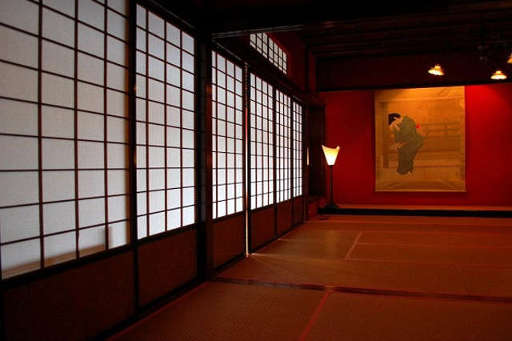
Photo by Patrick Colgan
Practical information
| View location on Google Maps | |
| Official website |
|
| 10:00-17:00 | |
| Tuesday (closing day may change depending on the season) | |
| 750 Yen | |
| 20 minutes’ walk east of JR station Kanazawa Loop Bus (stops RL4 and LL10) |
Hakuza Gold Leaf Shop
This is a shop selling products made from gold leaf, a speciality of Kanazawa. Inside the shop is a traditional Japanese warehouse that has been converted into a tea room and completely covered inside and out with gold leaves.
Eckhard Pecher, CC BY 2.5, via Wikimedia Commons
Practical information
| View location on Google Maps | |
| Official website |
|
| 9:30-18:00 (until 17:30 in winter) | |
| No closing days | |
| 20 minutes’ walk east of JR station Kanazawa Loop Bus (stops RL4 and LL10) |
21st Century Museum of Contemporary Art
The Museum of 21st Century Contemporary Art, also known as the Kanazawa Nijūichiseiki Bijutsukan, is a major cultural attraction in Kanazawa, Japan. This modern and elegant building houses an extensive collection of contemporary art works by international and local artists. Here, visitors can immerse themselves in 21st century artistic expression and admire innovative and avant-garde works. The museum also offers temporary exhibitions, workshops, and other activities to engage and inspire the public. A must for art enthusiasts and the curious in search of modern artistic discoveries.
金沢市, CC BY 2.1 JP, via Wikimedia Commons
Practical information
| View location on Google Maps | |
| Official website |
|
| Exhibitions: 10:00-18:00 (Friday and Saturday until 20:00) Public space: 9:00-22:00 |
|
| Monday (or the following day if Monday is a national holiday) 27 December to 1 January |
|
| Varies depending on the performance, usually 1200 Yen | |
| 35 minutes’ walk south-east of JR station Hokutetsu Bus (15 minutes from JR Station, 210 Yen) JR Bus (15 minutes from JR Station, 210 Yen), included in the Japan Rail Pass Kanazawa Loop Bus (LL8 and RL8 stops) |
Villa Seisonkaku
Villa Seisonkaku, in Kanazawa, Japan, is a precious historical mansion that offers a glimpse into the ancient culture and elegance of the Edo period. Built in 1863, the villa was the residence of one of the concubines of the feudal lord Maeda. Today, visitors can explore the beautiful gardens and admire the exquisite architecture with tatami mats and intricate room details. The Seisonkaku Villa is framed by a serene ambience, providing an authentic and luxurious experience of Japanese aristocratic life. An unmissable attraction for lovers of history and art.
663highland, CC BY-SA 3.0, via Wikimedia Commons
Practical information
| View location on Google Maps | |
| Official website |
|
| 9:00-17:00 Last entry 30 minutes before closing time |
|
| Wednesday (Thursday if Wednesday is a national holiday) 29 December to 2 January |
|
| 700 Yen (1000 Yen during special exhibitions) | |
| 35 minutes’ walk south-east of JR station Hokutetsu Bus (15 minutes from JR Station, 210 Yen) JR Bus (15 minutes from JR Station, 210 Yen), included in the Japan Rail Pass Kanazawa Loop Bus (LL8 and RL8 stops) |
Omicho Market
The Omicho market, also known as Omicho Ichiba, is a vibrant and colourful place in Kanazawa, Japan. Known as the city’s gourmet market, visitors can immerse themselves in an authentic culinary experience here. The market is famous for its wide selection of fresh produce, such as freshly caught seafood, local vegetables and delicious traditional sweets. It is also the ideal place to sample local delicacies, such as Kaisendon (rice with raw fish varieties). The Omicho market is a meeting point for locals and visitors wishing to discover the unique flavours and aromas of Kanazawa.
User: (WT-shared) Jpatokal at wts Wikivoyage, CC BY-SA 4.0, via Wikimedia Commons
Practical information
| View location on Google Maps | |
| Official website |
|
| 9:00-18:00 (may vary depending on shop) | |
| Sunday, New Year’s Day, National Public Holidays | |
| 15 minutes’ walk south-east of JR station Hokutetsu Bus (Musashigatsuji stop) Kanazawa Loop Bus (LL1 and RL15 stops) |
Kanazawa Castle
Kanazawa Castle, also known as Maeda Castle, dates back to 1583 and is one of the city’s most important landmarks. The original castle was destroyed by fire in 1759, but was promptly rebuilt into an even more spectacular seven-storey structure with a Japanese-inspired design. Today, the castle houses a museum displaying historical objects, paintings and maps of the city, and offers a panoramic view of the city of Kanazawa and its breathtaking surroundings. Kanazawa Castle is a must-see for those visiting the city in search of culture, history, and a breathtaking visual experience.
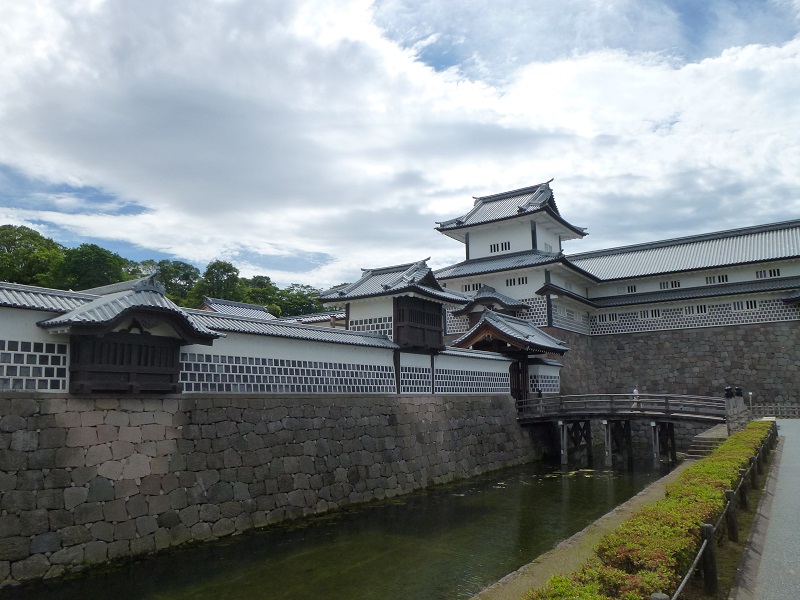
Photo by Japanforeveryone.com
Practical information
| View location on Google Maps | |
| Official website |
|
| Castle | |
| 7:00-18:00 (1 March to 15 October) 8:00-17:00 (16 October to 28/29 February) |
|
| No closing days | |
| Free | |
| Warehouse and turrets Gojukken Nagaya | |
| 9:00-16:30 Last entry 30 minutes before closing time |
|
| No closing days | |
| 320 Yen | |
| 25 minutes’ walk south-east of JR Kanazawa Station Kanazawa Loop Bus (LL9 and RL7 stops) |
Nagamachi District
The Nagamachi district in Kanazawa is a must-visit for travellers wishing to get in touch with Japanese tradition and immerse themselves in the life of the samurai. Here, visitors can discover the district’s quiet and picturesque streets, admire traditional samurai houses and visit Nomura House, a well-preserved mansion that displays the elegance and refinement of Japanese culture of the time. The Nagamachi district represents a perfect blend of historical architecture, traditional culture and samurai history, making it a unique and unforgettable experience for all travellers.
Saigawasakurabashi, CC BY-SA 3.0, via Wikimedia Commons
Practical information
| View location on Google Maps | |
| 20 minutes’ walk south of JR station By bus get off at the Korinbo stop and walk 5 minutes to the west |
Nomura-ke
Nomura-ke is a traditional Japanese mansion located in the Nagamachi district of Kanazawa. Built in the 17th century, the house belonged to a samurai family of the Nomura clan and is an exceptionally well-preserved example of Japanese feudal architecture. The house features a beautiful interior garden, a series of spacious rooms with low-level tables and a natural lighting system that brings the structure to life. The Nomura-ke is a must-see for lovers of traditional art and architecture, and offers a wonderful opportunity to discover the life of the samurai in Japan.
Practical information
| View location on Google Maps | |
| Official website |
|
| 8:30-17:30 (until 16:30 from October to March) | |
| 26 and 27 December 1 and 2 January |
|
| 550 Yen | |
| 25 minutes’ walk south from JR Kanazawa station Located in the Nagamachi district |
Maeda Tosanokami-ke Shiryokan Museum
The Maeda Tosanokami-ke Shiryokan Museum is a hidden gem located in Kanazawa. This museum offers a fascinating insight into the history and culture of the Maeda family, who ruled the Kaga region. Within its walls, visitors can admire a vast collection of historical artefacts, paintings, armour and important documents. The museum also presents a series of thematic exhibitions illustrating the cultural richness of Kanazawa. The Maeda Tosanokami-ke Shiryokan Museum is an essential cultural stop for those wishing to explore ancient Japanese nobility and immerse themselves in Kanazawa’s fascinating history.
Hirorinmasa, CC BY-SA 3.0, via Wikimedia Commons
Practical information
| View location on Google Maps | |
| Official website |
|
| 9:30-17:00 Last entry 30 minutes before closing time |
|
| Monday (next day if Monday is a public holiday) | |
| 310 Yen | |
| 25 minutes’ walk south of JR Kanazawa Station Take the Hokutetsu bus to the station and get off at the Korinbo stop The museum is located in the Nagamachi district, 5 minutes south of Nomura-ke |


